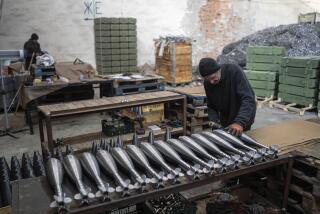Cash, Expertise Shortages Slow Polish Economy : Capitalism: After decades of centralized manipulation, it is no longer clear who owns what, what anything’s value is, how it can be sold or to whom.
- Share via
WARSAW — Wieslaw Panter rubbed his temples, furrowed his brow and sighed, already wearing the worried frown of a profit-or-perish chief executive.
Does he mull the future of his Krosno Glass Works? “During the day, at night, always.”
As the company’s general director, Panter is on the front line of the most ambitious transfer of a state-owned economy to private investors ever attempted.
Postcommunist Poland’s new economists want to create a Western European ownership structure in five years and put more than half the state’s assets into private hands within three years.
It is a task of staggering complexity. After 45 years of centralized manipulation, it is no longer clear who owns what, what anything’s value is, how it can be sold or to whom.
There is a dire shortage of capital and expertise. From front office to factory floor, management, motivation, productivity and efficiency are but dimly understood.
Circling two huge furnaces, where the heat shimmers and dryers bellow, Krosno’s glass blowers and their helpers wonder what it will mean for them.
Already, there have been layoffs. Among those remaining, there is no great enthusiasm for buying even deeply discounted shares and then getting down to work for unfettered profits.
“Why should I?” asked Teresa, a 15-year veteran of the assembly line. “I don’t think anything is for sure. Maybe if I make more, then I’ll buy.”
With a Western-style advertising campaign that encouraged Poles utterly unfamiliar with stocks, risks and bull markets to “learn the power of your money,” Krosno was among the first five industrial enterprises offered for sale.
The Privatization Ministry, housed in the former Censorship Office, chose the businesses least likely to go bankrupt and a feverish knot of young, English-speaking economists spent the last half of 1990 creating a capital market from nothing.
“Socialism adversely affected every company,” said Grzegorz Meza, one year out of university, who prepared the stock offering for Krosno Glass. “There was no financial accounting for economic reasons, only for tax reasons.”
All shares in the first five companies sold out, but the purchase period for four of them, including Krosno, had to be extended a month, into mid-January.
The privatizers said they were not discouraged because they started during a divisive presidential election, before Christmas and after Iraq had seized Kuwait.
That leaves 8,000 state enterprises to go: about 500 mammoth industries, 2,500 small- to medium-sized factories, 3,000 smaller companies and 2,000 operations controlled by provincial governments.
“It reminds us how many problems need to be resolved, how many new institutions established and how many specialists trained--in other words, how much must be done to generate, in a matter of just several years, what in Western countries took decades or centuries to develop,” economics commentator Piotr Aleksandrowicz wrote in the daily Rzeczpospilita.
Strategy for this year echoes President Lech Walesa’s battle cry: acceleration.
The privatizers plan to focus on smaller enterprises, creating modest companies that would provide many jobs for little investment.
They see this as an antidote to the expected “significant rationalization of enterprise operations,” bureau-speak for unemployment caused by cutting bloated payrolls and unprofitable production.
After that, economists plan to standardize the process and send representatives to get things moving in the provinces. Their plan for dealing with some of the top-to-bottom monopolies in publishing, agriculture and other fields is to sell the entire operation at once.
Jerzy Drygalski, undersecretary of state for privatization, cautioned that the old business structures are breaking down faster than new ones can replace them.
“If we are not able to outpace events, it will be too late,” he said. “The losses will be bigger.”
The best of the huge enterprises that dominated the planned economy will be sold to investors. The worst, especially steel mills, will await individual solutions.
In most cases, the privatizers must balance the need to diffuse ownership and encourage worker participation with the need for primary owners who will demand disciplined management.
They have rejected auctions because few Poles can afford to buy companies, and giving plants to workers because that would create neither capital nor management. Socialist ideologues have led many workers to think that they own their factories.
For many cases, the route chosen is an innovation: free distribution of large numbers of shares to all citizens, who will be encouraged to deposit them in new mutual funds managed with Western consultation.
Under that plan, the government would create a stock company wholly held by the Treasury, giving 10% of the shares to workers in the hope of creating immediate political support.
Vouchers would be issued for about 30% of shares in all enterprises involved, probably worth about $100 each, and every citizen would get one. Distribution of vouchers would begin in the second half of this year.
With enterprises generally in fragile shape and little financial data available, most people are expected to avoid the risk of buying a particular stock and put their vouchers into the mutual funds.
A combination of the funds; the social security agency, which will have 20% of the stock, and the new commercial banks, with 10%, will hold enough shares to make sure that the enterprises are managed properly.
The Treasury would sell the remaining 30% of the shares, probably to foreign investors.
Under the plan, the process will begin with 300 enterprises and aim at making 150 to 200 private by the end of this year.
Because state-owned industries are Poland’s national capital, the ministry has watchdog functions: preventing management-worker collusion to reduce a company’s value and make shares cheaper, bar takeovers by the former communist loyalists who still run many enterprises, and mediate foreign investment.
More to Read
Inside the business of entertainment
The Wide Shot brings you news, analysis and insights on everything from streaming wars to production — and what it all means for the future.
You may occasionally receive promotional content from the Los Angeles Times.










